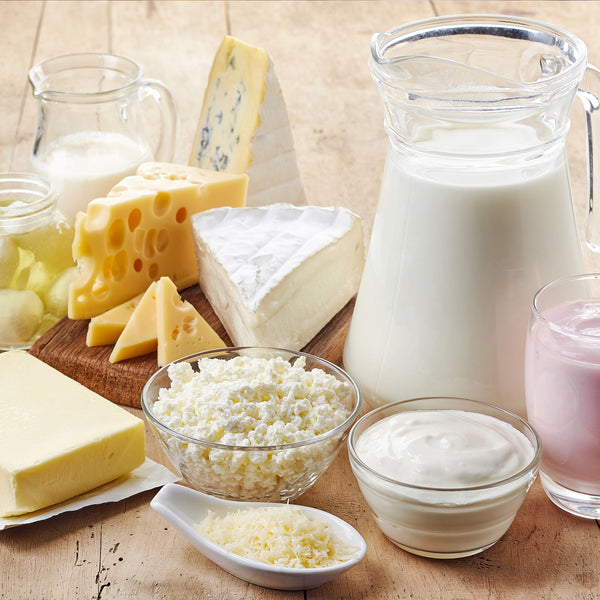
What is Lactose Intolerance?
The following information is geared towards those who suffer from lactose intolerance which is the inability to break down a sugar found in milk. Anyone with a dairy allergy should stay away from dairy at all times, regardless of whether a product claims to help, as an allergy is unrelated to lactose, it relates to the proteins found in dairy.
There are many forms of sugar, including lactose, which are made up of the two simple sugars glucose and galactose. Lactose is naturally found in milk and most dairy products, and as a result its name literally means “milk sugar.” For our body to use the nutrients found in lactose, an enzyme, called lactase, must split it into the two sugars it is made of.*
Enzymes, like those found in Devigest, are proteins that act as a catalyst in the body, to speed up a reaction that would normally occur much slower. Without enzymes, the metabolic processes of our body would simply not be possible in many cases. The enzyme lactase is produced by the cells that line the small intestines, it then breaks down the lactose into glucose and galactose, both of which are then absorbed into the blood.*
Lactose Intolerance
Unfortunately, in many cases, the body does not make enough lactase, or does not make any at all, so that the sugar lactose passes undigested into the colon, where bacteria then break it down, creating a lot of gas and causing pain. When the body does not make enough of the enzyme lactase, this is what we call “lactose intolerance,” as we cannot tolerate eating lactose without discomfort.*
The small intestines are most effective at making lactase from birth until a few years later, to allow infants to digest milk from the mother. Because babies can digest milk from the mother, they can also consume other types of milk as well, like cow’s milk. As many people get older, the body stops making lactase, or makes less of it. If the person continues to drink milk or eat milk products after this occurs, the lactose cannot be digested.*
Symptoms of lactose intolerance can include pain or bloating in the abdomen, excess gas, and in more severe cases, nausea or diarrhea after consuming lactose-containing products. Babies are normally born with the ability to make lactase, but it is common for older children and adults to be lactose intolerant. In fact, as many as 75% of the world's population suffers from some level of lactose intolerance [1]. While the condition is not dangerous, it can create uncomfortable symptoms and can also interfere with the pleasures of consuming dairy products. In addition to adults being more likely to have lactose intolerance, there are differences among ethnic groups in the tendency to stop making lactase [2,3].*
Lactose in the Diet
People with lactose intolerance have different types of reactions to lactose [4], and the more severe your reaction to lactose, the more you need help in getting your digestion back into balance with the right enzymes. If you have lactose intolerance, you may try to manage the condition by avoiding milk or milk products, like cheese or yogurt. However, it can be extremely difficult to avoid milk completely, as it is often used as an additive for many processed foods, such as bread and baked goods, salad dressings, candy, and even some processed meats, plus many more [3].*
Besides the difficulty of avoiding all milk in processed foods, when we avoid milk, we not only skip the lactose in the milk, but all the other nutrients in dairy as well, so that cutting out milk can potentially have other possible health effects [5]. The American Academy of Pediatrics recommends that children consume dairy products to maintain good health, and cutting out dairy products because of lactose intolerance goes against these recommendations [6]. Therefore, taking an enzyme supplement like Devigest that contains lactase allows you to continue eating dairy products without the pain and discomfort that usually accompanies lactose ingestion.*
Devigest contains 2,000 units of lactase in two capsules, the recommended dosage. For the best results, Devigest should be taken immediately prior to eating or with food, so that the enzyme is present with the lactose and can break down any lactose in the food. Because lactase will safely hydrolyze lactose into glucose and galactose, Devigest will help to maintain the natural process of the body and limit or negate lactose intolerance [6,7].*
Why Choose Devigest?
Devigest is more powerful and concentrated than other digestive enzyme supplements on the market. Devigest was also specifically formulated to be more effective and provide even greater relief for those suffering from all types of negative reactions to milk and dairy products.*
As mentioned above, lactose intolerance is very different to a dairy allergy. However, Devigest can still be beneficial for those with a dairy allergy in the event dairy is unknowingly consumed in small quantities. This is because Devigest contains a highly potent peptidase with 500 units of DPP-IV activity per serving that effectively breaks down casein, the protein that triggers the allergic reaction [8]. This is not to imply that one can suddenly enjoy dairy that is otherwise allergic, just that due to dairy's wide-ranging use in foods, it may be wise to include Devigest with meals that may contain dairy unbeknownst to the individual (such as at a restaurant or in a processed food that may have been cross-contaminated). Since Devigest contains such a complete and broad-spectrum formula, it makes other digestive enzyme supplements obsolete.*